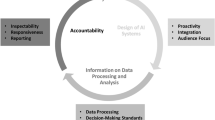Abstract
This paper is critical of some loose speculations about cybernetics, computers and “systems,” especially as to their role in organization and planning. There is a widespread tendency to believe that human and organizational vagaries can be eliminated by some combination of the former techniques. This tendency is encouraged by a bias towards mechanistic and abstract solutions for social problems. Further, there is a failure to properly take into account “natural laws,” in the sense of limitations on human and organizational ability, when developing normative models for policy and planning problems. “Viable holistic models,” supposedly, should replace human and organizational haphazardness; attention has been devoted tosubstituting the machine-techniques for the man, rather than concentrating on man-machine interactions, based on selective adaptations to natural laws.
Similar content being viewed by others
References
Argyris, C. (1962).Interpersonal Competence and Organizational Effectiveness. Homewood, Ill.: Richard D. Irwin.
Argyris, C. (1971). “Management Information Systems: The Challenge to Rationality and Emotionality,”Management Science,17 (February).
Archibald, K. (1970). “Three Views of the Expert's Role in Policy-Making: Systems Analysis, Incrementalism and the Clinical Approach,”Policy Sciences 1: No. 1: 43–86.
Ashby, W. (n.d.) “Review of Feigenbaum's Computers and Thoughts,” quoted in Dreyfus (1965), p. 5.
Barnes, M., Fogg, A., Stephens, C. and Titman, L. G. (1970).Company Organization. London: Allen and Unwin Ltd.
Beer, S. (1969).
Bobrow, D. (1970). “Computers and a Normative Model of the Policy Process,”Policy Sciences 1: 1, p. 123.
Braybrook, D. and Lindblom, C. (1961).A Strategy of Decision. New York: Free Press.
Buchanan, J. and Tullock, G.The Calculus of Consent. Ann Arbor: University of Michigan.
Cyert, R. and March, J. (1963).A Behavioural Theory of the Firm. Englewood Cliffs, N.J.: Prentice Hall.
Downs, A. (1957).An Economic Theory of Democracy. New York.
Dreyfus, H. (1965).Alchemy and Artificial Intelligence, P-3244. Santa Monica, Calif.: Rand Corp.
Dror, Y. (1968).Public Policy Making Re-examined. San Francisco: Chandler.
Dror, Y. (1970). “Prologomena to Policy Sciences,”Policy Sciences 1: No. 1, p. 135.
Ericson, R. (1969). “The Impact of Cybernetic Information Technology on Management Value Systems,”Management Science 16: No. 2.
Ference, T. (1970). “Organizational Science,”Management Science 17: No. 2.
Forrester (1969),
Grace, H. A. (1970). “Implications of Real-Time Systems for Management and Organizations,”Bulletin of the Institute of Management Sciences 16: No. 5, p. 50.
Gross, E. (1971). “On Lieberson's Study of Military-Industrial Linkages: A Fan Letter with Implications,”American Journal of Sociology 77: No. 1, 131–133.
Harsanyi, J. (1962a). “Measurement of Social Power, Opportunity Costs and the Theory of Two-Person Bargaining Games,”Behavioural Science 7: 67–80.
Harsanyi, J. (1962b). “Models for the Analysis of the Balance of Power in Society,” inProceedings of the 1960 International Congress for Logic, Methodology and Philosophy of Science, Stanford.
Huysman, J. (1970). “The Effectiveness of the Cognitive Style Constraint in Implementing O.R.-Proposals,”Management Science 17: No. 1.
Jantsch, E., ed. (1969).Perspectives of Planning. Paris: O.E.C.D.
Jones, C. H. (1970). “At Last, Real Computer Power for Decision Makers,Harvard Business Review, p. 75.
Kast and Rosenzweig (1970).Organization and Management; a Systems Approach. New York: McGraw-Hill.
Levinson, H. (1970). “Management by Whose Objectives,”Harvard Business Review, p. 125.
Lieberson, S. (1971). “An Empirical Study of Military-Industrial Linkages,”American Journal of Sociology 76: No. 4, 562–564.
Lindblom, C. (1965).The Intelligence of Democracy. New York: Free Press.
Linstone, H. (1970). The 1970's in the Aerospace Industry. Burbank, Calif.: Lockheed Aircraft Co. Quoted in11th American Meeting of the 1970 Institute of Management Sciences,16, No. 5, p. 74.
MacGregor, D. (1970).The Human Side of Enterprise. New York: McGraw-Hill.
Malik, R. (1971).New Scientist (March 4): p. 497.
March, J. and Simon, H. (1957).Organizations. New York: Wiley.
Nelson, R., Peck, M. J. and Kalachek, E. D. (1967).Technology, Economic Growth and Public Policy. Santa Monica, Calif. and Washington D.C.: The Rand Corp. and Brookings Inst., p. 171.
Newall, A., Simon, H. and Shaw, J. (1958).The Process of Creative Thinking. Santa Monica, Calif.: Rand Corp.
Pool (1969),
Schick, A. (1969).Public Administration Review (March).
Schlesinger, J. (1967).Systems Analysis and the Political Process. P-3464. Santa Monica, Calif.: Rand Corp.
Simon, H. (1957).Models of Man. New York.
Simon, H. (1961).Modelling Human Mental Processes. P-2221. Santa Monica, Calif.: Rand Corp.
Riker, W. H. (1962).The Theory of Political Coalitions. New Haven: Yale University Press.
Author information
Authors and Affiliations
Rights and permissions
About this article
Cite this article
Millar, J.A. Selective adaptation. Policy Sci 3, 125–135 (1972). https://doi.org/10.1007/BF01460087
Issue Date:
DOI: https://doi.org/10.1007/BF01460087




